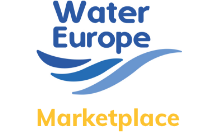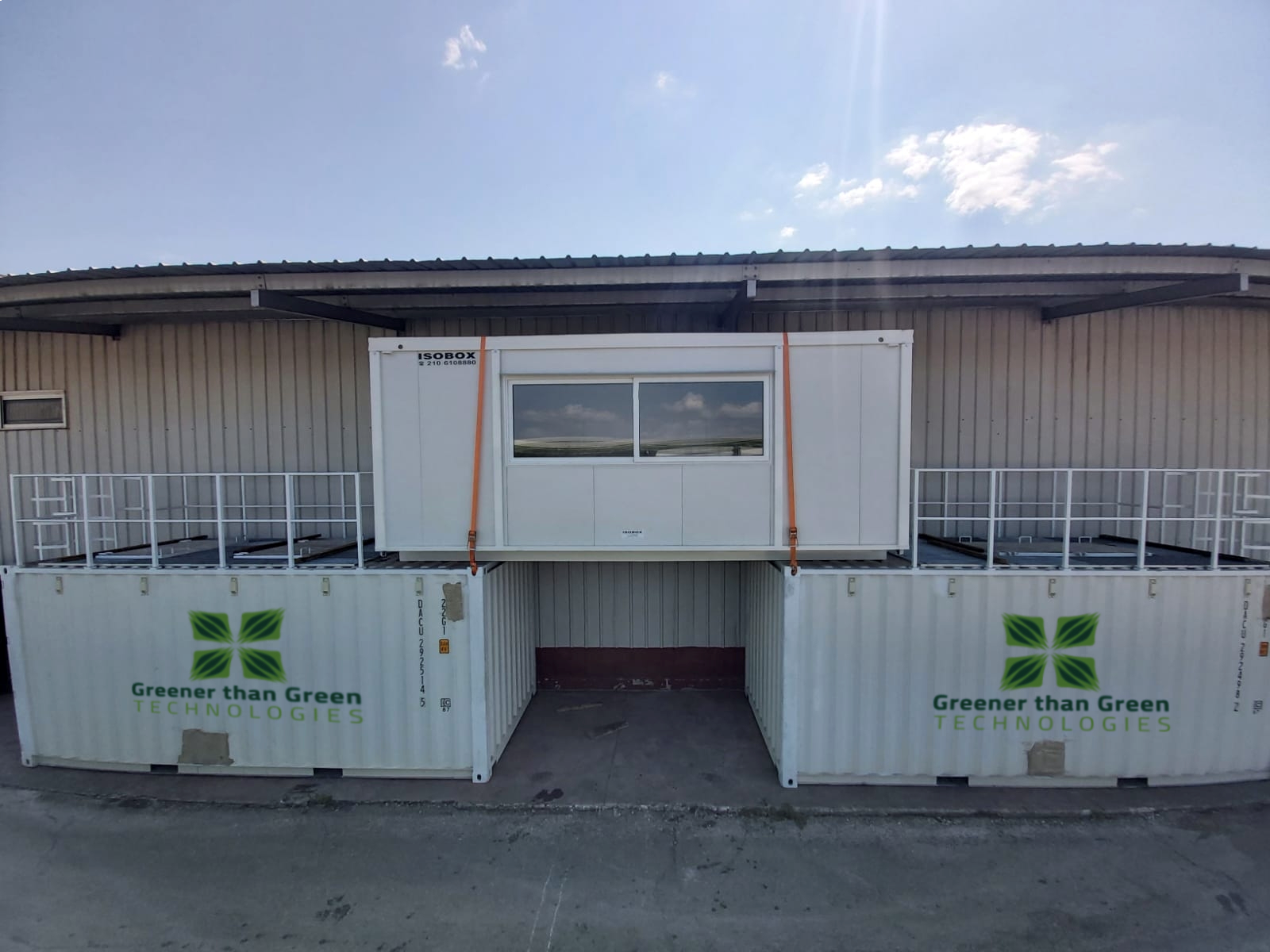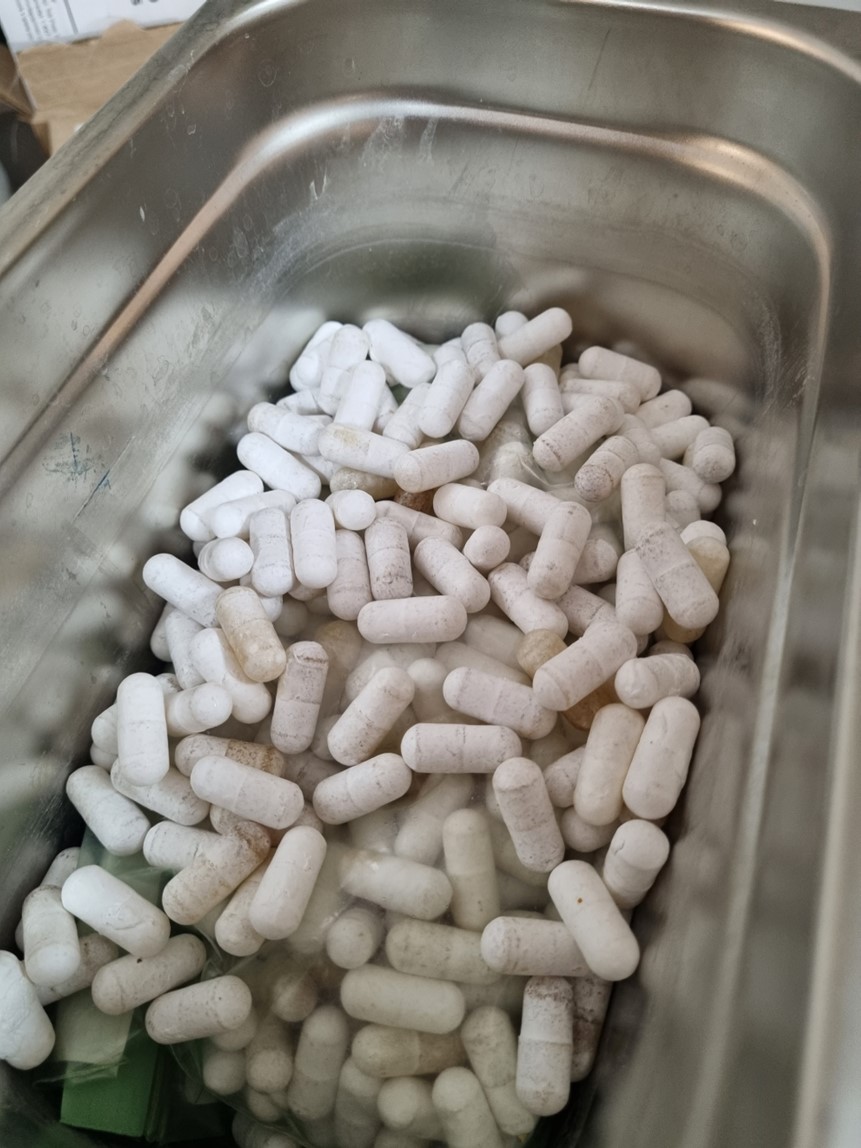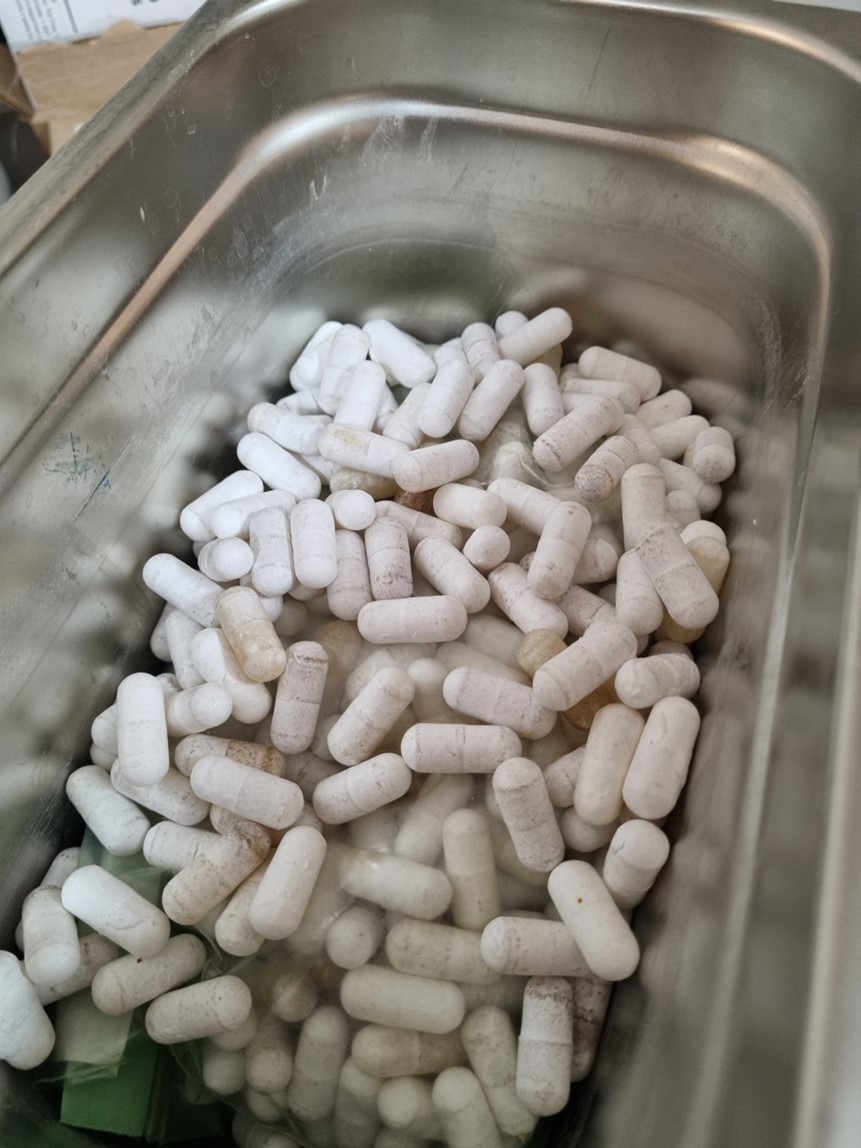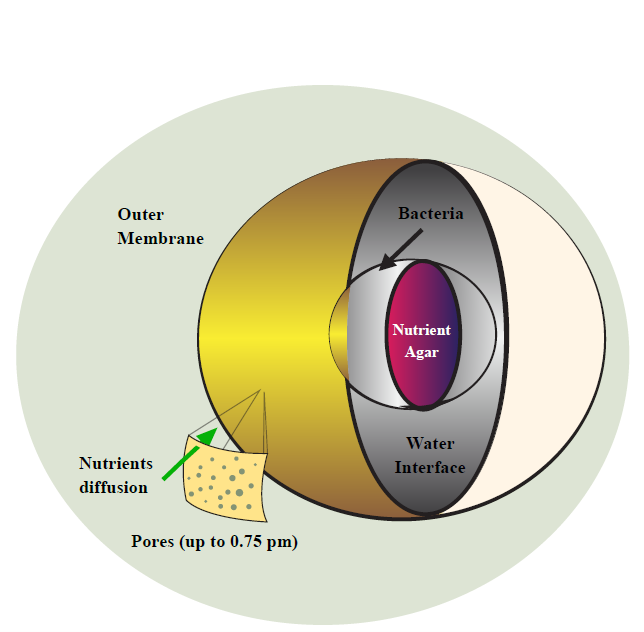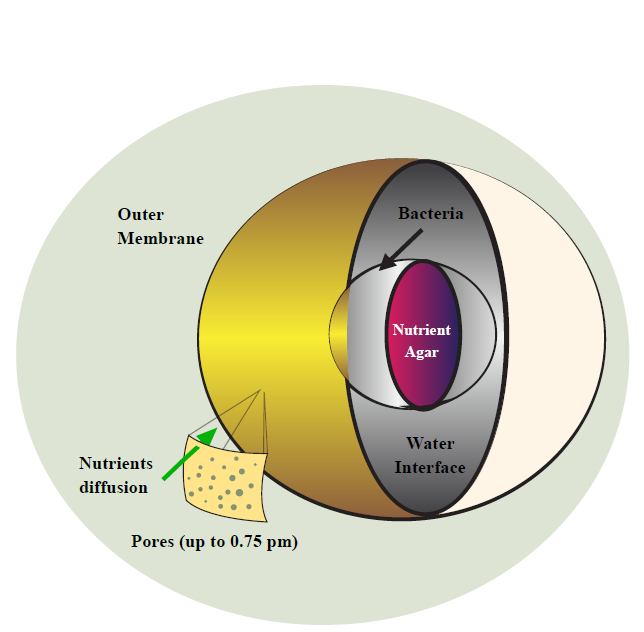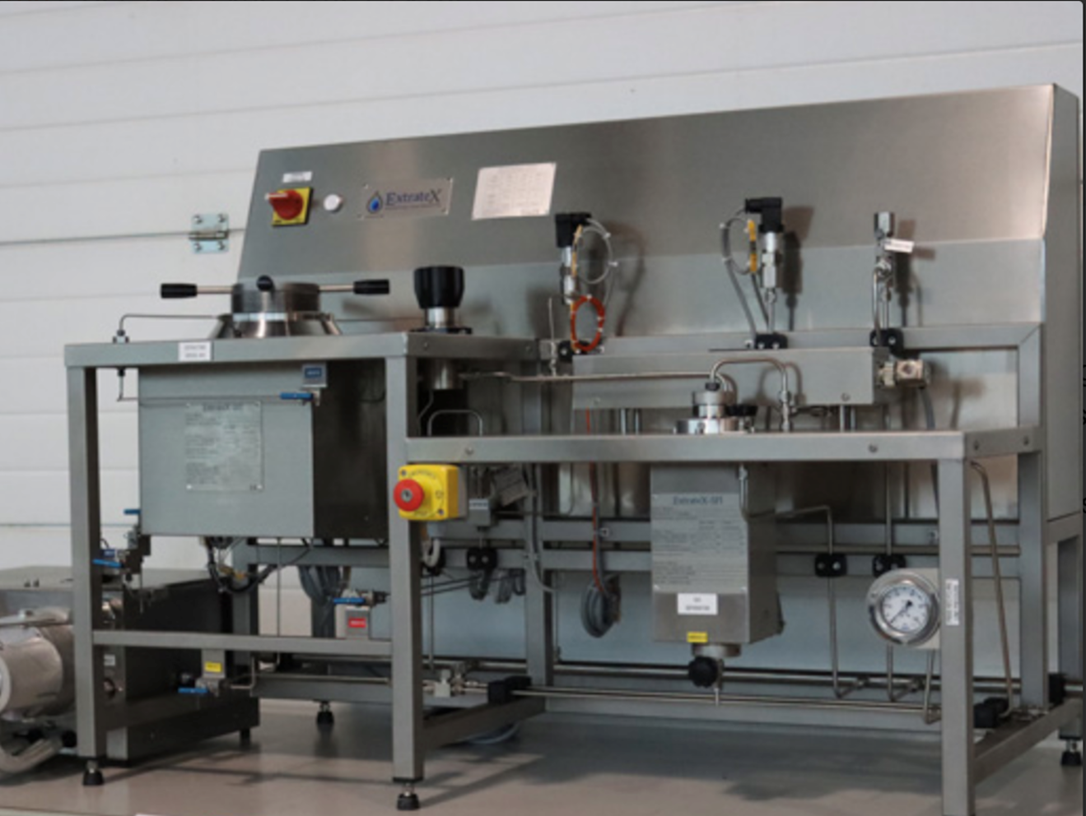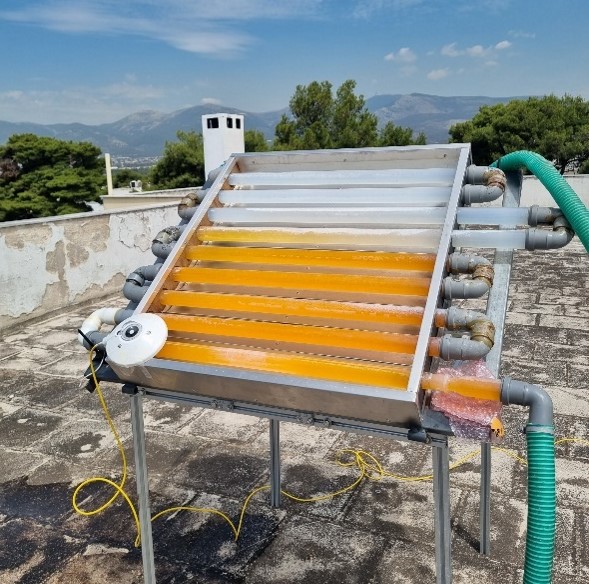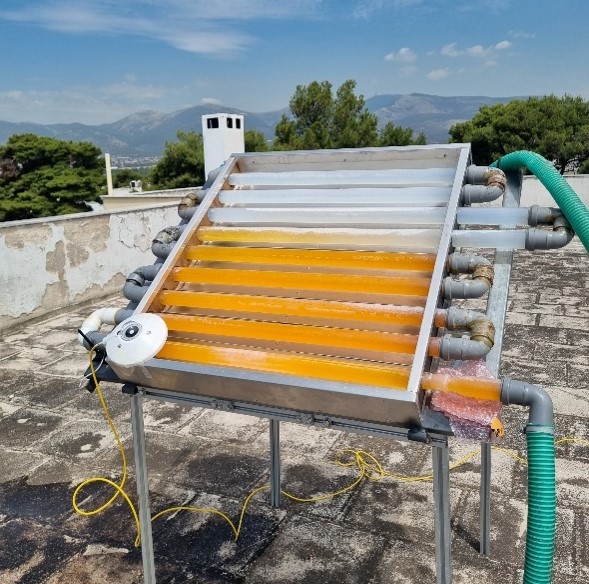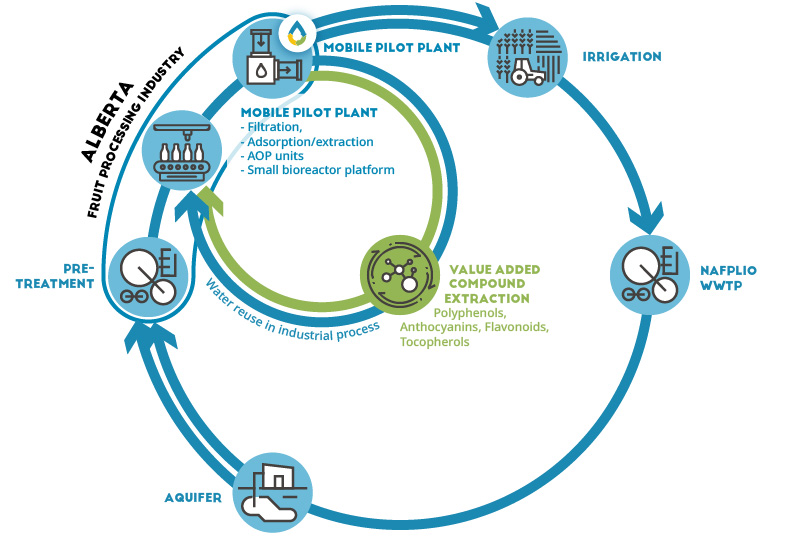Description
The eastern Peloponnese is one of the most important citrus fruit producing areas in Greece, while other fruits are commonly cultivated, such as stone fruits, berries, grapes and so on. This has given rise to the flourishing industry of juice manufacturing in the area, with a significant number industrial units of various sizes in the wider area. Intensive farming and increasing industrial activity exert great pressure in the aquifer with farmers and industrial units alike, are competing for ground water. Hence Water recycling has become imperative tackle the competition for water and the diminishing quality of the aquifer. Greener than Green Technologies has developed a methodology for the remediation of wastewater rendering it suitable for reuse, but also provides the ability to extract compounds of interest, or value-added compounds (VAC), form wastewater for further purification and commercial commercialisation. A prototype has been developed and installed in the facilities of Alberta, a juice manufacturer, near Nafplion, in the eastern Peloponnese. The prototype incorporates number of established and novel technologies. At first VACs are extracted by adsorption on suitable material, scubas polymeric resins. Suspended solids are then precipitated before further treatment by Advanced Oxidation process (AOP), where organic matter is decomposed by photocatalytic oxidation. Τhis can lead to either complete mineralisation i.e. decomposition to CO2 or simply to either smaller molecular entities that are easier be decomposed by the next step. The resulting is then subjected to biological treatment using a Small Bioreactor Platform (SBP) where bacteria encapsulated in a capsule made of a porous membrane decompose the remaining organic matter rendering the wastewater suitable for reuse; irrigation of nearby orchards, reuse within the facility for secondary uses such as cleaning or simply dispose of it in the local or municipal biological wastewater treatment plant as less organic burden as possible. In parallel to ULTIMATE, Greener than Green Technologies is developing an AI and machine learning enchanted Decision Support Software (DSS). This will not only control the unit, but will also process signals from built-in and external sensors, as well as gather historic and other external data such as weather forecast, in order to determine the most suitable way to reused the reclaimed water. The DSS prompting the user with simplified information, and decision choice, reduced the need of highly skilled personnel for supervising or running the unit. The business model upon which this technology will be made available to the market also offers and innovative aspects, aligned with the principles of circular economy. The unit has been designed to be mobile and quickly deployable. Units will be offered as a “Product-as-a-Service” (PaaS), rather than sold, only for the desired time slot, to cover the seasonal needs of customers.
Applied technologies
Technology performance and best practices
Mobile unit to treat and recycle water
The Greek case study developed and demonstrated a mobile unit to treat and recycle water and value-added compounds contained in aqueous industrial by-products. Specifically, fruit processing effluent was treated with VesperXTM, a system that combines physico-chemical and biological methods to isolate value-added compounds and make the water suitable for irrigation or industrial reuse.
Several technologies were tested. An adsorption/extraction module for value-added compounds was used, followed by coagulation to remove suspended solids and 50% of the total organic carbon (TOC). The pH-adjusted water was then treated with Advanced Oxidation Processes (AOP) using compound parabolic concentrator (CPC) and annular photocatalytic reactors. A small bioreactor platform (SBP) was also used when required. AOP and SBP together improved treatment efficiency, reducing time and cost.
Recovery of value-added compounds
The value-added compounds were selectively adsorbed onto a solid phase material with a high affinity for phenolic compounds relative to other chemical species. Application of the technology demonstrated the potential for 90% water recovery (relative to the water present in the industrial by-product) and 75% recovery of the total phenolic content (relative to the total phenolics present in the industrial by-product). In order to scale up and replicate this material recovery technology on a large scale, it is strategic to reduce the treatment costs by developing new and inexpensive adsorption media as well as convenient extraction methods. Phenol extraction was tested using three different methods, including conventional extraction, subcritical water extraction and supercritical CO2 extraction, with the latter two methods showing great promise for significantly improving the overall efficiency of the process.
Solar AOP reactor
The solar AOP reactor did not reduce TOC as expected, likely due to organic molecules fragmentation without full mineralisation to CO₂. However, in the annular AOP reactor, H₂O₂ was used to avoid complex catalyst recovery, resulting in complete degradation of a model compound and 50% mineralisation within 30 minutes.
Outcome of assessments
Total cost of ownership (TCO)
The technology (VesperX™) is offered as a Product-as-a-Service (PaaS) by Greener Than Green Technologies. As such a TCO assessment was not applicable. Instead of selling the physical product, the company provides a service where industries subscribe to a flat fee for installing and using the VesperX™ system, which processes water and extracts value-added compounds (VACs). The ownership and responsibility for the equipment remain with the service provider, and customers only pay for the services they use, eliminating the need for them to bear the technology’s TCO. Their model aligns with Circular Economy principles and aims to reduce operational complexity for the customer, making it easier to adopt new technologies. Revenue projections suggest that with an average annual investment of 900,000 EUR, the company expects to expand from 25 units in the first year to 160 units by year five, generating over 17 million EUR in revenue.
Quantitative chemical risk assessment (QCRA)
The water reclaimed from fruit processing in Nafplio can be reused as irrigation water for local orchards. As it may contain pesticide residues, a theoretical QCRA was performed for the soil and groundwater compartments and mass flow thresholds were calculated for enilconazole as an example substance using Monte Carlo analysis. The results can be used for risk assessment after collection of real analytical data from irrigation water.
Legislation and policy recommendations
Clarifying responsibilities and developing consistent guidelines for water reuse licensing and service provision across the EU are essential to ensure effective practices. The strategic agenda proposes comprehensive coverage of all water reuse types, emphasizing safety, environmental impact assessment, and the integration of reclaimed water into local water balances based on regional circumstances. Future regulations should establish minimum standards for non-agricultural uses, enhance risk assessment, and promote research on innovative water reuse technologies and practices. (see also D1.10)
